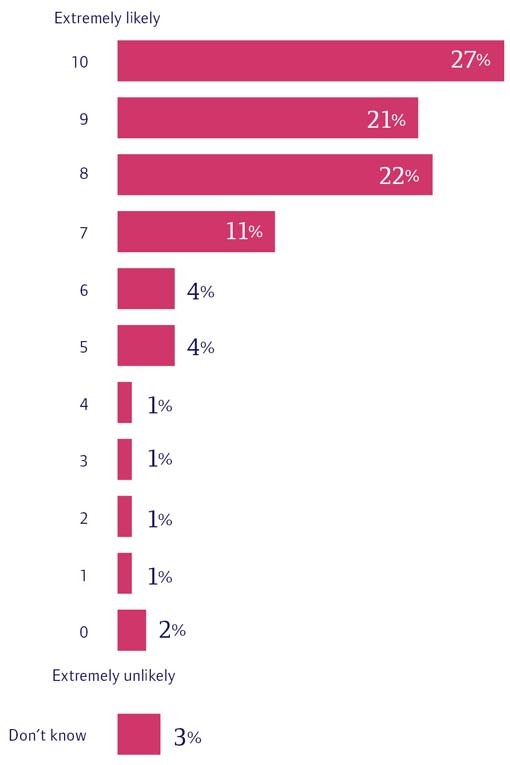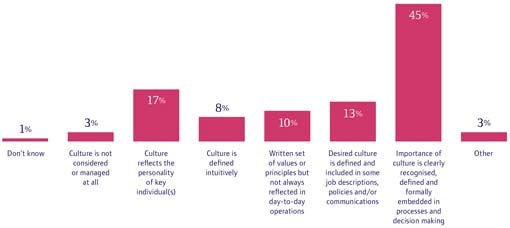While NFP directors give the culture of their organisations a resounding endorsement, not enough boards in the sector are actively managing their cultures, the 2017 NFP Governance and Performance Study found.
Organisational culture is a key reason people choose to work and volunteer with not-for-profit (NFP) organisations. A collective sense of mission and purpose is an attractive proposition to potential team members, and compares favourably to the financial focus of for-profit companies.
Getting culture right is fundamental to achieving an organisation’s mission and strategic objectives. Strong culture is critical to building morale within a workforce, creating cohesive teams, and ensuring high standards of integrity. Performance and culture therefore are inextricably linked.
Poor culture can undermine an organisation’s ability to achieve its goals. It can lead to disengagement from stakeholders, increased absenteeism, and difficulty in attracting and retaining talented staff and volunteers. Poor culture can also erode the trust of donors and government, endangering funding, and can increase the risk of legal or regulatory action. At the most extreme, poor cultures can lead to harm for clients, who are often among the most vulnerable in the community.
Top of mind
Distilling a sense of culture at one organisation is challenge enough, let alone taking a snapshot of culture across a sector as diverse as the NFP sector. As a way of measuring organisational culture across the NFP sector from a personal, rather than theoretical, perspective, this year's Australian Institute of Company Directors NFP Governance and Performance Study, the largest study of its kind in Australia, asked directors how likely they would be to recommend their NFP as a place of work to friends or family. Willingness to recommend the organisation to friends and family is treated as a proxy for how the directors perceive culture at their organisation. Directors would consider issues such as staff morale, whether they nurture their employees and whether generally they are ‘good’ places to work, both in terms of their values and in the sense of work satisfaction.
Most directors gave a resounding endorsement of their organisation as a place to work. More than 70 per cent would be very likely (8 or above) to recommend their organisation to friends and family. This was also reflected in the comments from directors in the focus groups that supplemented the survey. Directors noted the commitment, passion and engagement of their organisation’s staff in making an impact on people’s lives. They also pointed to harmonious and supportive workplace environments at their organisations. “We value our employees and do meaningful work”, said one director. “Our organisation has a committed and caring environment that has been operating for almost 120 years,” said another. The pride of many directors in overseeing healthy workplace environments was obvious from the focus groups.
A small minority of the directors surveyed – one in ten – would not be likely to recommend their organisation as a place to work, giving a rating of five or below. For the most part, however, this group of directors cited operational difficulties, rather than cultural problems, as motivating their decision. These challenges included reductions in funding, uncertainty of employment and lack of resources. This result underscores how important it is for government to provide certainty around funding and resourcing to NFPs. The AICD continues to advocate for a best practice funding model of five-year cycles and 12-month notice periods of termination of funding. Some directors identified poor leadership and governance, and out-of-date practices as the reasons for their low score on the question. “It is currently a patriarchal organisation that resists change and especially improved governance, but we are getting there slowly,” a director with similar frustrations said in the focus groups. Nonetheless, it is clear that generally directors believe the NFPs they govern have strong cultures, making them favourable places to work.

Low on the agenda
Although the culture of an organisation can appear to be intangible, there is increasing awareness of the need for boards and management to set, demonstrate and actively create the culture they would like to see in their organisation. There are many practical ways for boards to take a hand in shaping organisational culture.
Many boards formally define an ideal culture and work with staff and stakeholders to develop strategies to achieve it. For example, establishing codes of conduct around ethical standards (and ensuring that these are communicated, understood and adhered to) can be a powerful way to send a message about cultural expectations.
The selection of a CEO and senior leadership team can be a significant influence on culture, and it is commonplace now to see cultural factors as essential components of executive performance evaluation frameworks. Because of the impact that an executive team can have on culture, it is prudent to establish reporting guidelines and robust whistleblower programs to ensure that behaviour outside the bounds of the expected culture are brought to the attention of senior leaders and the board.
Fewer than half (45 per cent) of the directors surveyed said the culture of their organisation was clearly defined and formally embedded in their systems and policies. Thirteen per cent said the desired culture was defined, but that it had only been included in some job descriptions and policies. Although only three per cent of directors said that culture was not considered or managed at all, many organisations had an underdeveloped or informal approach to managing culture. A quarter of directors surveyed said that either the culture of their organisation reflects the personality of key personnel, or the culture of the organisation is defined intuitively.

Even among the group of directors who said that their organisation’s culture had been clearly defined and formally embedded, most said that oversight at the board level was minimal. Of this group:
- More than a third (36 per cent) reported that culture had not formally been part of their agenda for 12 months;
- A third (29 per cent) said that their board did not receive reports, or set organisational KPIs, based on culture; and
- Nearly half (46 per cent) said that culture had been discussed at the board level at least five times in the last twelve months, but, importantly, only when it arose in regard to other matters. Overall, more than half (52 per cent) of directors surveyed said that culture was not formally part of the board agenda in the last 12 months, while 48 per cent said that they had not received any reports on organisational culture in the same time period.
The fact that many NFP boards are not actively considering culture as part of their agenda, or setting and embedding cultural expectations for their organisation, does not necessarily mean the culture at those NFPs is deficient. The vibrancy and general success of the NFP sector suggests this is not so. Strong cultures can also emerge through informal, organic processes, possibly based around strong personalities at the organisation and a deep sense of shared vision and purpose. However, culture is too important to be left to chance and boards should take an active role in managing culture.
To read more from this year's NFP Governance and Performance Study, click here.
Latest news
Already a member?
Login to view this content

